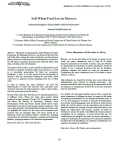Boughlala M., Sabilla R., Oyetunde D. (2024). Soft wheat food loss in Morocco. African and Mediterranean Agricultural Journal - Al Awamia, 20/04/2024, n. 143, p. 281-294.
https://doi.org/10.34874/IMIST.PRSM/afrimed-i143.48174
https://doi.org/10.34874/IMIST.PRSM/afrimed-i143.48174
| Titre : | Soft wheat food loss in Morocco (2024) |
| Auteurs : | M. Boughlala ; R. Sabilla ; D. Oyetunde |
| Type de document : | Article |
| Dans : | African and Mediterranean Agricultural Journal - Al Awamia (n. 143, April 2024) |
| Article en page(s) : | p. 281-294 |
| Langues : | Anglais |
| Langues du résumé : | Anglais |
| Catégories : |
Catégories principales 08 - ALIMENTATION ; 8.3 - Politique et Sécurité AlimentaireThésaurus IAMM PERTE ; GASPILLAGE ALIMENTAIRE ; REDUCTION DES DECHETS ; BLE ; BLE TENDRE ; CHAINE D'APPROVISIONNEMENT ; MAROC |
| Résumé : |
Taking the recommendations of the Regional Strategic Framework for Reducing Food Loss and Waste in the Near East and North Africa region, this study specifically, provides decision makers in Morocco with the necessary information to cut food loss for soft wheat, it promotes good practices along the entire value chain, and helps policy development.
The purpose of this study is to give specific insight into the causes of food loss along the soft wheat supply chain in Morocco as well as to investigate opportunities for food loss prevention. Ultimately, it aims to set the ground for the Government to develop a food loss prevention roadmap for soft wheat, which could serve as guidance towards mitigating food loss of other seeds. In order to address the study objectives, we used two methodologies to collect the necessary data, individual semi-structured interviews for wheat importers, millers, wheat traders, and focus group discussion for farmers. Results of this study show that Morocco is experiencing food loss at different levels. Wheat loss takes place mainly during traditional storage, between 10% and 15%. To minimize losses in soft wheat, the Ministry of Agriculture, Fisheries, Rural Development, Water and Forests should initiate direct contact with farmers who harvest and manage storage warehouses. This can be done through a well-trained team of extension workers who can highlight the reasons for the losses and disseminate good practices that can minimize them. The focus should be on enhancing small and medium farmers’ warehouses, including construction and insulation techniques, cleaning and disinfecting methods, packaging materials and ventilation requirements. |
| Cote : | En ligne |
| URL / DOI : | https://doi.org/10.34874/IMIST.PRSM/afrimed-i143.48174 |







